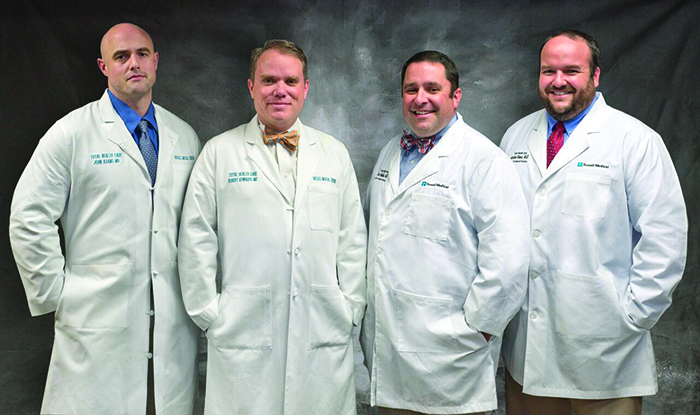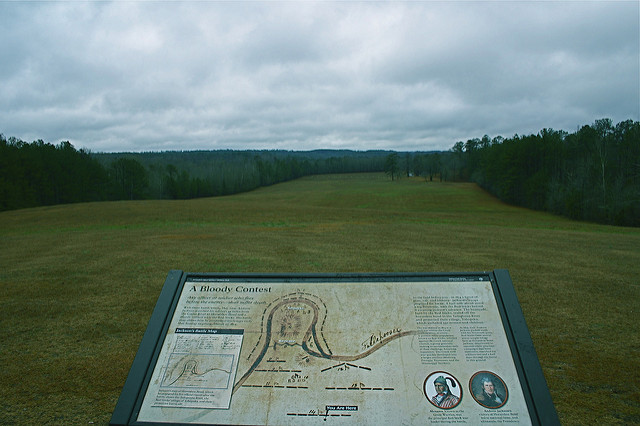 Four graduates of the School of Medicine's Rural Medicine Programs have joined a new primary care clinic, Total Healthcare, in Alexander City.Tate Hinkle, M.D., a 2014 School of Medicine alumnus, has wanted to practice rural medicine for as long as he can remember. He grew up in Lanett, about 30 miles northeast of Auburn in Chambers County, and has fond memories of staying on his grandparents’ farm. “It was a big part of my upbringing, being from a small town in a rural area,” Hinkle says. “That’s why I was drawn to rural medicine.”
Four graduates of the School of Medicine's Rural Medicine Programs have joined a new primary care clinic, Total Healthcare, in Alexander City.Tate Hinkle, M.D., a 2014 School of Medicine alumnus, has wanted to practice rural medicine for as long as he can remember. He grew up in Lanett, about 30 miles northeast of Auburn in Chambers County, and has fond memories of staying on his grandparents’ farm. “It was a big part of my upbringing, being from a small town in a rural area,” Hinkle says. “That’s why I was drawn to rural medicine.”
Tallassee native and 2014 alumnus Justin Vines, M.D., also dreamed of practicing medicine in a rural community. “I feel that a rural doctor is the quintessential doctor,” Vines says. “A rural physician personifies the ideal of being able to deal with whatever comes through the door.”
“It’s a different kind of practice, practicing in a rural community versus an urban setting, because we don’t have everything at our disposal,” Hinkle says.
In addition to graduating from the School of Medicine in 2014, Hinkle and Vines share something else: They both participated in Rural Medicine Programs at the School of Medicine’s Regional Medical Campuses in Huntsville and Tuscaloosa, respectively. Now they, along with two other Rural Medicine Program graduates, are providing care for residents of Alexander City and the surrounding area at the new Total Healthcare primary care clinic at Russell Medical, an affiliate of UAB Health System.
The ribbon cutting for Total Healthcare took place on Nov. 30 and an associated Urgent Care Clinic opened on Dec. 4. The 11,000-square-foot building, which includes labs and the extended hours urgent care facility run by a nurse practitioner, is the result of years of planning by Russell Medical’s board of directors and management to invest in primary care for rural Tallapoosa County.
Primary Care Crisis
In its 2017 report “Complexities of Physician Supply and Demand,” the Association of American Medical Colleges (AAMC) predicts a looming shortage of physicians in the U.S., with one of the deepest deficits in primary care. The shortage is even more pronounced in rural areas, and 54 of Alabama’s 67 counties are considered rural. The AAMC has ranked Alabama 45th in the nation for the number of active primary care physicians per 100,000 in population.
Tallapoosa County is experiencing health care challenges common to rural areas across the country: an aging population and an aging primary care physician workforce concentrated primarily in Alexander City. One of those physicians is in his early 70s and another is in his 80s, both with large practices. Russell Medical CEO Jim Peace says he and the board realized the remaining doctors could not absorb those patients alone when those physicians retire, so they began working to create a team-based care model with telemedicine capabilities at Russell Medical.
“We’re looking at a community with a service area of about 55,000 in our primary and secondary areas,” Peace says. “We knew that we had a shortage of primary care, but we had to approach the problem in a different way. And we had to not think about next year, but 10 years from now. This is not a race; it’s a journey. It is a piece of the future of primary care.”
 Left to right: School of Medicine alumni John Adams, Robert Edwards, Tate Hinkle, and Justin Vines all participated in Rural Medicine Programs at the school’s Tuscaloosa and Huntsville Regional Campuses. They have joined a new primary care practice at Russell Medical in Alexander City. Photos courtesy of Russell Medical.
Left to right: School of Medicine alumni John Adams, Robert Edwards, Tate Hinkle, and Justin Vines all participated in Rural Medicine Programs at the school’s Tuscaloosa and Huntsville Regional Campuses. They have joined a new primary care practice at Russell Medical in Alexander City. Photos courtesy of Russell Medical.
Helping provide health professionals for rural communities in need is what both the Rural Medical Scholars Program (RMSP) at the Tuscaloosa Regional Medical Campus and the Rural Medicine Program (RMP) at the Huntsville Regional Medical Campus were created to do. Students from rural communities in Alabama apply to those programs in hopes of returning to their home areas to practice medicine. The programs include a pre-matriculation year at The University of Alabama or Auburn University, in which the students take coursework related to rural health and bolster their science courses. Once that year is complete, the students spend their first two years of medical school at the School of Medicine’s main campus in Birmingham before completing their final two years in Tuscaloosa or Huntsville.
“The four of us have ties to this part of the state and all came through the Rural Medicine Programs, so we have a unique ability to set up a practice where we can use that training and knowledge to realize what rural medicine should be in Alabama,” Vines says.
“As Alabama’s premier medical school, part of our responsibility to the state is to train more primary care physicians and alleviate the lack of access to health care in our rural areas,” says Selwyn Vickers, M.D., FACS, senior vice president for medicine and dean of the School of Medicine. “We are very proud of alumni like these, who through their actions are helping us meet the critical mission of our Rural Medicine Programs.”
Rural Roots
 Tallapoosa County is home to Horseshoe Bend National Military Park, the final Creek War battle site. Photo courtesy of Alabam Tourism Department.The first physician to join Total Healthcare was Robert Edwards, M.D., a 2011 alumnus who completed the Rural Medicine Program and a family medicine residency in Huntsville. An eight-year veteran of the U.S. Navy, Edwards is an engineer-turned-physician originally from a small town in North Carolina. He says he realized soon after his interview that Alexander City was where he wanted to practice. “It was that connection with the town that reminded me a lot of where I grew up. I felt at home,” Edwards says.
Tallapoosa County is home to Horseshoe Bend National Military Park, the final Creek War battle site. Photo courtesy of Alabam Tourism Department.The first physician to join Total Healthcare was Robert Edwards, M.D., a 2011 alumnus who completed the Rural Medicine Program and a family medicine residency in Huntsville. An eight-year veteran of the U.S. Navy, Edwards is an engineer-turned-physician originally from a small town in North Carolina. He says he realized soon after his interview that Alexander City was where he wanted to practice. “It was that connection with the town that reminded me a lot of where I grew up. I felt at home,” Edwards says.
For Edwards, another advantage to working in the rural clinic is the fact that he can treat a patient who walks through the door, admit that patient to the hospital if needed, and visit that patient throughout his or her hospital stay. “I even drove two of my patients to the emergency room recently,” Edwards says. “They had the flu, and I put them in my pickup and drove them myself.”
The next physician to join the practice was John Adams, M.D., a 2012 alumnus and a Calera native who says he wanted to work somewhere similar to his hometown that had a Catholic church. Alexander City fit the bill. “I’ve always liked the small-town feel,” he says. “Everybody down here is pretty genuine and honest.”
Adams says he spends 90 percent of his time talking to patients, reminding them—many of whom have poorly managed diabetes and/or high blood pressure—of the importance of a healthy diet. He says he also deals with many patients who have psychiatric issues. “Anybody who is thinking about practicing in a rural area should pay attention in psych,” Adams says. “Get ready, because it’s out there.”
In addition to working in Alexander City, Adams also spends time each week at a rural health clinic in Goodwater that is staffed by a nurse practitioner. That clinic was intended to be one of four satellite clinics, with each of the four Total Healthcare physicians visiting the four clinics each week. For the plan to work financially, Russell Medical is working to get Tallapoosa County federally designated as a Health Professional Shortage Area, or HPSA, to obtain federal dollars. But Peace says their efforts to recruit primary care doctors to Alexander City is a double-edged sword because it becomes harder to qualify for shortage area designation at the same time that new physicians are being recruited to the area.
Peace says if they are unsuccessful in their application this year, they will look at other options for financially sustaining the remaining satellite offices. In the meantime, the four doctors continue assisting the roughly 14,000 residents of Alexander City plus the residents of the surrounding area while integrating themselves into the community and planting roots in Tallapoosa County.
“Medical school teaches you how to be a doctor,” Hinkle says. “But being a doctor is more than medical care; it also turns you into a leader in the community.”
By Ryan Broussard